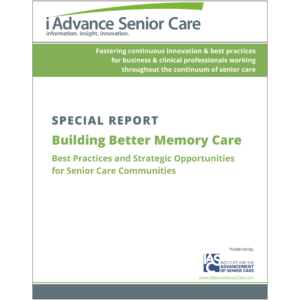More than a game: Brain training against dementia
The number and severity of those currently and predicted to be afflicted with Alzheimer’s disease are well documented but no less staggering. In the most recent report published by the Johns Hopkins Bloomberg School of Public Health and presented at the 2007 International Conference on Prevention of Dementia in Washington, D.C., an estimated 5 million people in the United States and 26.6 million worldwide are currently afflicted with the disease. The report estimated that incidence of the disease will quadruple, to more than 20 million people in the United States and more than 106 million worldwide, by 2050.
Nor is Alzheimer’s the sole focus of concerns regarding cognitive functioning of older adults. Indeed, the disease represents only 50–70% of all dementia. Cognition skills, as with physical skills, begin to decline in all individuals after age 50. A 2006 study by researchers at Mayo Clinic showed a 12–15% incidence rate of mild cognitive impairment (MCI) in study participants age 70–90. MCI affects cognitive function but may or may not lead to dementia.
With one U.S. baby boomer turning 65 every eight seconds, companies marketing products to improve or maintain cognitive function—or at least slow the decline—are on the rise. The Hopkins report added to this interest by estimating that interventions delaying onset of Alzheimer’s symptoms by as little as one year would reduce prevalence of the disease by 12 million cases by the 2050 projection.
Knowing the urgency to address increases in the number of people affected by cognitive deficits, and the potential to reduce such deficits through neuroscience principles, are there technologies that can assist long- term care providers in implementing “brain-training” activities for their residents?
“Nana” Technology
Several years ago I coined the term “Nana” Technology to describe microchip-based technologies “designed, intended, or that can otherwise be used to improve quality of life for older adults.” This term also established six categories through which such technologies can be tracked and evaluated, including those for health, safety, cognition, communication, lifestyle, and whole home/integrated systems. Of these, none has generated more interest and attention than products for cognition, often referred to as “brain games.” Understanding that such technologies are relatively new and awaiting long-term study, the following four examples are among the best currently available for use in long-term care environments:
Posit Science™–Brain Fitness Program 2.0
Developed in conjunction with more than 50 brain scientists, the program uses software that can be purchased for a home- or facility-based computer. Recommended “training” includes completion of 40 hours of a variety of 15-minute exercises over 90 days. A peer-reviewed study completed by the company showed an average 10-year improvement in memory among participants, with results maintained three months after conclusion of the training.
The current program includes headphones and is based on “audio” training—addressing the tendency of brains to become “lazy” in listening skills as we age. By focusing on improving listening skills, users can improve their memory and attention to detail. A “vision” version is next on the horizon for the company, with other modules to follow.
MindFit™
Another software program, MindFit, is part of a portfolio of products available from CogniFit™, an Israel-based company focusing on cognition products for people of all ages. The software provides a patented “Individualized Training System (ITS),” taking users through 24 20-minute training sessions. Recommended participation is three times per week. Results of an independent, double-blind study released by the company at an international Alzheimer’s conference in Salzburg, Austria, in March showed short-term memory improvement of 18% among participants age 50 and over.
The exercises on MindFit can be especially challenging, including a “Picasso” exercise in which abstract shapes must be duplicated following only a few seconds of viewing. The exercises present both audio and visual challenges following an initial “evaluation” through which an individualized training regimen is established.
Dakim [m]Power™
Currently available only in assisted living, retirement, and related senior housing communities, the [m]Power was developed by former Hollywood and Disney executives in conjunction with the UCLA Center on Aging. A stand-alone touch-screen system eliminates the need for either a keyboard or a mouse. “EasyTouch™” log-on allows those with early- to mid-stage dementia to access and participate in a variety of entertaining and engaging activities across six cognitive domains. Results are uploaded daily to a central computer, allowing for individualized programming designed to maximize participation and results.
Using the [m]Power is more like watching and participating in TV than enduring a workout. Yet the science behind the state-of-the-art technologies and activities is the same as for other cognition programs. Because of its entertainment value and ease of use, the [m]Power may represent the most likely of currently available cognition technologies to assist those with MCI or early- to mid-stage Alzheimer’s.
MyBrainTrainer.com™
For individual residents or facilities looking for an instant-access and economical—although not scientifically tested—product, this Web-based program provides 39 exercises based on neuroscience and includes a recommended 21-day training program. The site is not targeted specifically to seniors; participants of any age can track and measure personal results on a “Brain Diary” or against any of the site’s 12,000 members by age, occupation, or other characteristics.
Brain Fitness at Any Age
While completing crosswords or playing bingo and bridge are beneficial, they are the equivalent of completing only “push-ups” or “sit-ups” without achieving the “full-body” workout needed to maximize fitness. The critical factor in all of the above training systems is their ability to “cross-train” the brain through a variety of neuroscience-targeted skills and brain areas.
Just as with physical exercise, brain exercise can maximize functioning at any age. In a December 2006 study published in the Journal of the American Medical Association, participants ranging in age from 65 to the early 90s were able to improve memory, reasoning, and speed of mental processing through a series of 10 progressively challenging training sessions, performing better than a control group. More telling, the participants were still able to outperform the control group in each of these areas—by 300%, in the case of speed of mental processing—a full five years after completion of the sessions.
Can technology-based “brain games” reduce overall facility acuity and staff stress while improving resident satisfaction and reducing length of stay? Again, the need to evaluate any of the new “brain games” for long-term results remains a necessity, but one fact remains clear to all long-term care providers: Maximizing cognitive strength among residents should be thought of these days as more than just a “game.”
Andrew Carle, MHSA, is Assistant Professor and founding Director of the Program in Assisted Living/Senior Housing Administration at George Mason University in Fairfax, Virginia. His work in the area of “Nana” Technology has been featured nationally and internationally in/on USA Today, UPI, the New York Times, AARP Bulletin, Washington Post Radio, Fox Morning News, Retirement Living TV, Kyodo News, the Australian Broadcasting Corporation, and numerous industry publications and media.
For further information, phone (703) 993-9131 or visit www.assistedliving.gmu.edu. To send your comments to the author and editors, e-mail carle0807@nursinghomesmagazine.com.
Sidebar
For more information, visitwww. positscience.com.
Sidebar
For more information, visitwww. cognifit.com.
Sidebar
For more information, visitwww.dakim.com.
Sidebar
For more information, visitwww.mybraintrainer.com.
I Advance Senior Care is the industry-leading source for practical, in-depth, business-building, and resident care information for owners, executives, administrators, and directors of nursing at assisted living communities, skilled nursing facilities, post-acute facilities, and continuing care retirement communities. The I Advance Senior Care editorial team and industry experts provide market analysis, strategic direction, policy commentary, clinical best-practices, business management, and technology breakthroughs.
I Advance Senior Care is part of the Institute for the Advancement of Senior Care and published by Plain-English Health Care.
Related Articles
Topics: Activities , Articles












